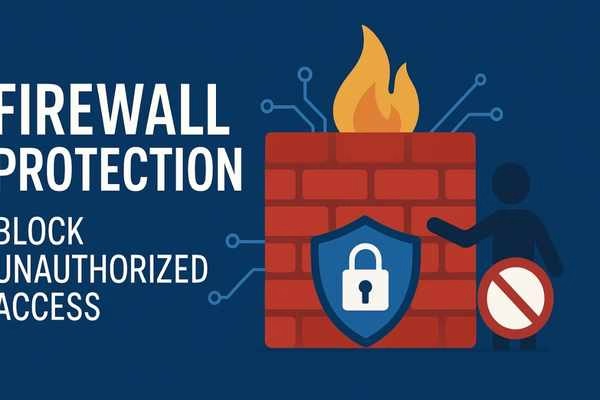In the digital age, where data is a crucial asset for individuals and organizations alike, safeguarding information has become paramount. One of the most effective tools in the arsenal of cybersecurity is the firewall. Firewall protection serve as a formidable barrier between private networks and potential threats from the outside world, blocking unauthorized access while permitting legitimate communication.
Understanding Firewalls
Firewalls are network security devices or software programs that monitor and control incoming and outgoing network traffic based on predetermined security rules. They act as a filter between your internal network and external sources, such as the internet, thereby preventing malicious traffic from entering the system.
Types of Firewalls
Packet-Filtering Firewalls: These are the most basic type of firewall protection . They inspect packets of data as they attempt to enter or leave the network and allow or block them based on source and destination IP addresses, ports, or protocols.
Stateful Inspection Firewalls: Building upon packet-filtering firewalls, these track the state of active connections and make decisions based on the context of traffic, such as whether a packet is part of an established connection.
Proxy Firewalls: Also known as application-level gateways, these firewalls act as intermediaries between users and the internet. They filter requests at the application layer, providing a higher level of security by examining the actual data being transmitted.
Next-Generation Firewalls (NGFWs): These advanced firewalls offer capabilities beyond traditional firewalls. They integrate features like intrusion prevention systems (IPS), encrypted traffic inspection, deep packet inspection, and application awareness.
Hardware vs. Software Firewalls: Hardware firewalls are physical devices that protect entire networks, while software firewalls are programs installed on individual computers to protect them from unauthorized access.
How Firewalls Block Unauthorized Access
Filtering Traffic
Firewalls filter incoming and outgoing traffic based on a set of security rules. These rules are defined by the network administrator and can be customized to suit specific needs. By examining packet headers for information like source and destination IP addresses, port numbers, and protocols, firewalls can determine whether to allow or block the data.
Monitoring Traffic
Stateful inspection firewalls go a step further by monitoring the state of active connections. This allows them to make more informed decisions about which packets to allow. By understanding the context of each packet, these firewalls can block unsolicited traffic that does not match any established connection.
Preventing Spoofing
Firewalls can prevent IP spoofing, a technique used by attackers to disguise malicious traffic as legitimate. By verifying the origin of incoming packets, firewalls can block those that appear to be from untrusted or suspicious sources.
Blocking Malicious Software
Firewalls can block traffic from known malicious IP addresses or domains, preventing malware from entering the network. Additionally, advanced firewalls with intrusion prevention capabilities can detect and block suspicious patterns that may indicate a cyberattack.
Protecting Against Distributed Denial of Service (DDoS) Attacks
Firewall protection can mitigate DDoS attacks by identifying and blocking suspicious traffic patterns that aim to overwhelm the network. By filtering out excessive requests from a single source or blocking traffic from known malicious entities, firewalls help maintain network availability.
Configuring Firewalls for Optimal Protection
Define a Robust Security Policy: Establish clear rules for what traffic is allowed or denied based on your organization’s security needs. Regularly review and update these rules to adapt to evolving threats.
Implement the Principle of Least Privilege: Ensure that only the necessary traffic is allowed through the firewall. Restrict access to essential services and applications to minimize potential entry points for attackers.
Use Network Segmentation: Divide your network into segments with different security levels. This limits the spread of potential intrusions and ensures that sensitive data is only accessible to authorized users.
Regularly Update Firewall Software and Firmware: Keep your firewall software and firmware up to date to protect against the latest vulnerabilities and exploits.
Monitor and Audit Firewall Logs: Routinely review firewall logs to detect any unusual activity or potential security breaches. Automated tools can help identify patterns that may indicate a threat.
Enable Intrusion Detection and Prevention Systems (IDPS): Integrate IDPS with your firewall to detect and block suspicious activity in real-time.
The Importance of Firewalls in Modern Cybersecurity
Firewalls are a critical component of a comprehensive cybersecurity strategy. They provide a first line of defense against unauthorized access and play a crucial role in maintaining the integrity and confidentiality of sensitive information.
Enhancing Network Security
By filtering out unwanted traffic and preventing unauthorized access, firewalls enhance overall network security. They protect against a wide range of cyber threats, including hacking attempts, malware, and data breaches.
Ensuring Compliance
Many industries are subject to strict regulatory requirements regarding data protection. Firewalls help organizations comply with these regulations by safeguarding sensitive information and ensuring that only authorized users can access it.
Supporting Business Continuity
Firewalls play a vital role in maintaining business continuity by preventing disruptions caused by cyberattacks. By blocking unauthorized access and mitigating threats like DDoS attacks, firewalls help ensure that network resources remain available and operational.
Conclusion
In a world where cyber threats are constantly evolving, the importance of robust firewall protection cannot be overstated. By blocking unauthorized access and filtering out malicious traffic, firewalls serve as a critical defense mechanism for safeguarding sensitive data and maintaining network security. Properly configured and regularly updated firewalls are an indispensable part of any cybersecurity strategy, providing peace of mind and protection in an increasingly connected world.


